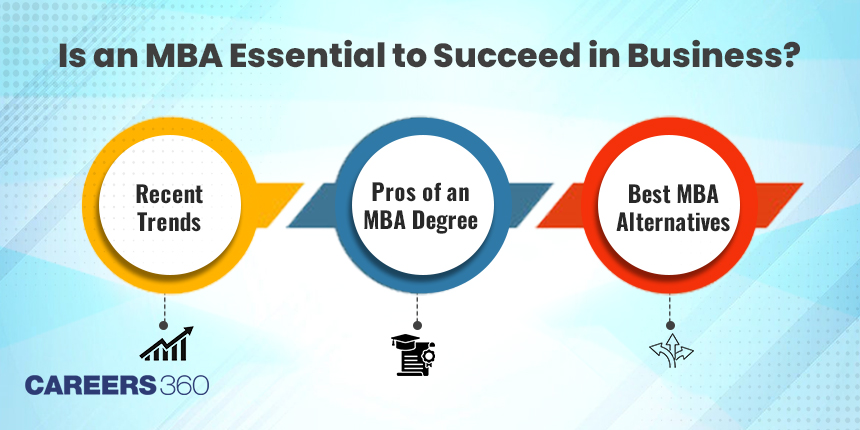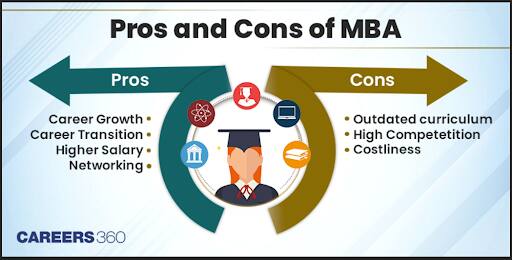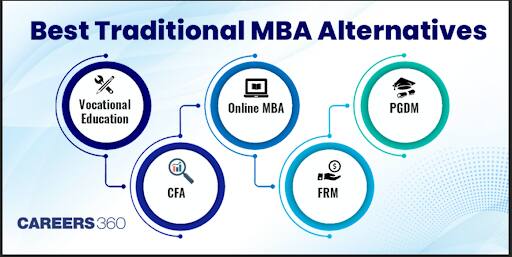IBSAT 2025-ICFAI Business School MBA/PGPM 2026
IBSAT 2025-Your gateway to MBA/PGPM @ IBS Hyderabad and 8 other IBS campuses | Scholarships worth 10 CR
“You don't need a four-year college degree if you have burning ambition or a great plan” - Alan Gerry

MBA, popularly known as Master of Business Administration, is a postgraduate degree programme in management discipline. MBA is a globally recognised degree generally opted by business aspirants. Students learn essential skills required to operate and manage an organisation. MBA is one of the most popular degrees most commonly pursued by BBA aspirants.
Students can pursue an MBA through various study modes, such as full-time, online, executive or part-time MBA. Students can also pursue an integrated MBA programme which combines undergraduate and postgraduate degrees. BTech MBA and BBA MBA are the popular integrated MBA degrees. Popular specialisations include finance, marketing, and human resource management.
Whether an MBA is a prerequisite for business success remains a hot topic. Many people may agree that it equips individuals with essential managerial skills, professionalism, and access to better job opportunities. However, practical knowledge and skills matter more than any degree.
In this article, we will explore this further. It will include recent trends and developments in business education, the pros and cons of an MBA degree and its various alternatives.
We also connected with a couple of professors and working professionals for their opinions on the topic of discussion. They had mixed thoughts about the same. While initially, they agreed an MBA degree is not required to succeed in business, they admitted that an MBA has its benefits.
With recent developments such as the shift towards online education, the rise in entrepreneurship, and the use of AI tools such as ChatGPT, Google Bard, and Microsoft Copilot, the current scenario of business is undergoing a lot of changes. However, the curriculum of a traditional MBA degree has remained very consistent throughout the years. It should be updated to meet the changing trends and demands.
The curriculum of an MBA degree should focus more on practical skills than just theoretical knowledge. Some of the recent developments in business education are mentioned below.
IBSAT 2025-Your gateway to MBA/PGPM @ IBS Hyderabad and 8 other IBS campuses | Scholarships worth 10 CR
Partnerships with diverse assortment of global organizations and industry leaders | Industry-driven curriculum
“I believe an MBA degree can provide many advantages such as a good theoretical understanding of business concepts, a professional network, and valuable skills; but it is not the only path to success in the business world. Professional certifications, practical experience, and self-study can also contribute to growth. Success depends more on practical knowledge and experience than any degree,” Aruj Arora, Principal Consultant, Kincentric, Gururgram

We also conducted a short poll on LinkedIn about this topic. Around 80 per cent of the respondents agreed that business success is possible without an MBA degree. While the remaining 20 per cent think an MBA is necessary to succeed in business.
“An MBA degree can be considered for a variety of reasons. It offers good skill enhancement, career advancement, and good networking opportunities. It also provides diverse skills which help a person to explore various fields."
Aruj Arora
Principal Consultant
Kincentric
MBA still offers many benefits which make it worth considering. If you are interested in getting high-paying jobs, switching your career, or starting your own business, an MBA degree is the one for you. It also provides good exposure and learning opportunities.
Good Investment in Yourself: An MBA can also prove to be a good investment. It provides an opportunity to grow both personally and professionally. During the course, candidates learn many skills which will help them in their careers.
Career Transition: An MBA degree is offered in various specialised fields such as finance, marketing, human resources, international business and business analytics. It expands your knowledge and prepares you for a variety of job roles after graduation.
High Earning Potential: MBA graduates are one of the highest-paid in India. An MBA provides a well-rounded education in different management areas which makes the candidates appealing to employers and provides them with higher salary packages. The skills they acquire make them a valuable asset to the company.
Increased Job Opportunities: An MBA degree can significantly increase your job opportunities. Many companies particularly look for MBA graduates. They can join senior-level positions at MNCs and government agencies.
Good Networking Opportunities: Networking plays a crucial role in MBA programmes. It provides students a chance to connect with industry experts and peers. The MBA curriculum also includes industry visits, which provide massive opportunities to build networks and connections.
“Successful businesses demand timely decision-making. An MBA can provide some valuable skills. This makes the graduates more appealing to employers. It also increases the probability of making one’s business profitable. However, many successful businesses have been built by promoters without any formal business education.”
Dr Sunil K Roy
Professor
MRIIRS, Faridabad
While it is true that an MBA is considered a golden ticket to success, the return on investment depends on your experience and career path. A business school does not guarantee a good career. It can provide you with the knowledge and skills, but ultimately it depends on your hard work and dedication.
“There are certain factors one should consider when opting for an MBA. It often requires a huge investment, and if the return on investment and job profile are not according to their requirement, it can lead to dissatisfaction”.
Aruj Arora
Principal Consultant
Kincentric
With technological advancements, we have all the relevant information at our fingertips. It may not be necessary to spend all your life savings or take a loan for an MBA degree. While an MBA has its benefits, there are some major drawbacks too.
Expensive: An MBA degree has become very expensive. With each passing year, the fee across all colleges and institutes is increasing. High tuition fees can also lead to student debt which may contribute to stress and burden amongst students.
Outdated Curriculum: The course curriculum of a traditional MBA degree has remained more or less consistent. With recent developments like Artificial Intelligence (AI) and new-age skills, the curriculum should focus more on practical skills and upcoming developments and trends.
Inconsistent Return on Investment (ROI): MBA is a huge investment and the return on investment is not always consistent. It generally depends on how much you spend on your education. Still, it is largely influenced by the career path and job role selected by the individual. Therefore, many people find it difficult to pursue an MBA.
No Placement Guarantee: Graduating with an MBA degree does not guarantee a successful career path. Business schools can help by providing relevant knowledge and skills, but candidates have to put in their best efforts to land a job.
High Competition: MBA is a highly competitive management degree. The selection procedure is also very strict. Many leading B-schools such as IIMs also require candidates to have some prior work experience which makes it challenging for those wishing to pursue an MBA after graduation.
More Focus on Theoretical Knowledge: The MBA curriculum has been traditionally focused towards theoretical knowledge. Valuable attributes such as leadership, decision-making and managerial skills require hands-on experience which many business schools fail to provide. While theoretical knowledge is essential, business is a highly practical field which requires good real-life knowledge.
“I don’t think an MBA is essential to succeed in business. To succeed in business you should have an aim, dedication, and hard work. MBA does help in building connections, but the real learning is through practical experience.”
Anchal Gupta
Senior Analyst
KPMG India
An MBA is often considered a golden chance for a high-paying career, but success is not necessarily limited to a degree. While many believe an MBA degree is the only way to a good business education, however, there are many alternative paths. Some of the popular ones are mentioned below.

Vocational Education: Vocational education can be a great alternative to a traditional MBA degree. It is a form of educational training that equips students with specialised skills and knowledge related to a specific profession. The focus is on training and hands-on experience. Vocational education can be helpful because many employers give more importance to practical knowledge than any management degree.
Online MBA: An Online MBA programme allows students to study from any location and choose their preferred study hours. Candidates can study at their own pace and balance work with their personal lives. Online MBA degrees are often more cost-effective than a full-time MBA degree. It also saves commuting or accommodation costs associated with a regular MBA.
Online certification courses and boot camps: Many online educational platforms like Coursera and Udemy offer specialised certification courses in various management disciplines. These courses allow students to study at their own pace and convenience. A standard MBA degree often requires full-time commitment and attendance for two straight years. These certification courses allow the students to target specific skills relevant to their careers.
PGDM: Postgraduate Diploma in Management or PGDM is a diploma programme. The curriculum is more industry-centric than a traditional MBA degree. PGDM curriculum is regularly updated, while an MBA curriculum has been consistent. PGDM may also be more affordable as compared to an MBA degree.
Practical Work Experience: Many employers prefer candidates to have some prior work experience. An MBA degree provides good theoretical knowledge but it lacks in providing relevant hands-on skills. When you’re working, it gives you an insight into real-world business situations and problems. It also makes you stand out from other job applicants.
Executive education programmes, certification courses like CFA and FRM, self-study or working on personal projects are some interesting options that can be explored for good business knowledge and skills.
“There are many professional certifications, vocational education, and online degrees which can be used to enhance one’s business knowledge and provide practical insights.”
Aruj Arora
Principal Consultant
Kincentric, Gururgram
PGP HRM, MDI Gurgaon
Also Read:
MBA is one of the most popular and high-paying degrees in the world. Many management aspirants wish to pursue the same from leading institutes in India. As per the survey that we have conducted, an MBA degree is not mandatory for business success but it may help you at some point in your career.
MBA does indeed provide some benefits, but in today’s digital world, we can get any information we require quickly. Apart from this, there are several other alternatives. Therefore, it depends on the individual whether or not having an MBA degree is essential for business success.
On Question asked by student community
The Master of Business Administration (MBA) degree offers a wide range of specialized fields, allowing professionals to focus their expertise on specific industries or business functions. Choosing the best specialization depends heavily on your prior work experience, career goals, and the industry you wish to target. You can explore a detailed list of all MBA types and specializations here: Choosing the best specialization depends heavily on your prior work experience, career goals, and the industry you wish to target. You can explore a detailed list of all MBA types and specializations here: Types of MBA Courses and Specializations .
Hello,
Here are Types of MBA Scholarships in India:
Now, here Popular MBA Scholarships:
Aditya Birla Scholarship
OP Jindal Management Scholarship
IIM Scholarships
Government Scholarships
For more details access below mentioned link:
https://bschool.careers360.com/articles/scholarship-for-mba-students-in-india
Hope it helps.
Hello,
There are many options that you can pursue. The list is below.
1. management consultant
2. Business Analyst
3. investment banker
4. Financial Manager
5. Marketing Manager
6. Human Resources
7. The It manager
8. entrepreneurship
9. data analyst
Thank You. Feel free to ask for more information.
Good Afternoon,
MBA eligibility criteria require
1. a bachelor's degree
2. must clear national exams like CAT, XAT, NMAT, CMAT
3. Students must clear the group discussion and personal interview.
4. Placements depend on colleges and universities.
Best colleges for placements are
1. IIMs and IITs of any city
placement needs proper communication skills, leadership skills, PPT and projects or other skills that a company mentions.
Thank You.
Good Morning,
NIT Rourkela CAT cutoff range is between 70-85 percentiles for the general category. 70 is the minimum percentile needed to apply, and 85 is the highest percentile. However, the maximum percentile depends on the particular year competition. It can be changed.
Thank You.
Globally Recognized by AACSB (US) & AMBA (UK) | 17.8 LPA Avg. CTC for PGPM 2025
Top 30 Private B-Schools Nationally and Top 3 in Gujarat | Highest CTC- 20 LPA | Average CTC- 8.4 LPA | 40% Pre-Placement Offers | 670+ Recruiters
UGC Approved Programs | Near 100% Placement Record | Up to 100% Scholarships | Highest CTC 21.32 LPA
Highest CTC 51.38 LPA | Median CTC 10.32 LPA | Top 25% Average CTC 14.32 LPA
Ranked among top 10 B-Schools in India by multiple publications | Top Recruiters-Google, MicKinsey, Amazon, BCG & many more.
EFMD Accredited | AACSB & Business Graduates Association Member | Highest CTC 19 LPA | Application Closing on 7th Jan'26